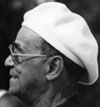12.18.3 Ibrahim Ferrer

Ibrahim Ferrer, a Cuban son singer with a pure, soft voice, was born in 1927 in Santiago de Cuba. He nearly died of tetanus during his childhood, and although he had high hopes of becoming a doctor, the death of his mother when he was 12 forced him to take to the streets selling candy and popcorn to make ends meet.
A year later, he and his cousin started a group, Los Jóvenes del Son, to sing at neighborhood festivals. Later, he continued singing in various local bands— Conjunto Sorpresa, Conjunto Wilson, and Pacho Alonso Maravilla de Beltran’s Conjunto.
In 1955, he recorded a hit album, “El Plantanar de Bartolo,” with the most popular orchestra in Santiago de Cuba at the time, Chepín-Chóven. This brought him some local fame, but the song was released worldwide without his name.
He moved to Havana in 1957 and worked with the legendary Orquesta Ritmo Oriental and the great Benny Moré. He later joined Pacho Alonso y sus Bocucos, who also moved to Havana.
In all these performances, Ferrer was primarily employed to sing guarachas, sones, and other rhythmic numbers. However, his core always belonged to that slow-burning, classic ballad form, the bolero.
In 1962, Bocucos toured former socialist countries, playing at the French Communist Festival “Fete de l’Humanité” in Paris, the Verno Exhibition in Prague, and finally at Moscow’s Bolshoi Theatre. Ferrer remained with Bocucos until 1991, losing his enthusiasm for music.
Then, years later, during the Buena Vista sessions, Ry Cooder asked if there was a warmer voice that could be found for Bolero. Juan de Marcos Gonzáles, musical director of Sierra Maestra and A&R for the Buena Vista sessions, immediately thought of Ibrahim Ferrer. At the EGREM studios (1008 3rd Street between 10th and 12th Streets, Miramar, Playa, Havana), he found the esteemed Cuban musicians Rubén Gonzáles with Compay Segundo, Eliades Ochoa, Barbarito Torres, and “Guajiro” Mirabal.
Ibrahim Ferrer sang on the Grammy-nominated album “Afro Cuban All Stars” and the Grammy-winning “Buena Vista Social Club,” which has sold more than six million copies. His subsequent solo album, “Buena Vista Social Club presents Ibrahim Ferrer,” has sold 1.5 million copies. Produced by Ry Cooder, it demonstrated his formidable skill as a rhythmic improviser and, perhaps more importantly, his definitive mastery of the Bolero, most evident in the fiery duet “Silencio” with Omara Portuondo.
During the last few years of his life, Ibrahim toured almost constantly around the world, with a band that was a “dream come true” for him, featuring musicians of the stature of “Guajiro” Mirabal. In 2003, he performed at notable concerts, including one at London’s famous Royal Albert Hall.
His second solo album, released by World Circuit in 2003, earned him well-deserved critical acclaim. Buenos Hermanos is an album full of variety and energy, the repertoire ranging from classic songs to stirring examples of the romantic boleros for which Ibrahim Ferrer became so famous, but all of this is presented in a different and fresh way.
The album received praise from almost everyone: The Guardian called it ‘exquisite’; Time Out (London) called it ‘fantastic’; and The Times said it was ‘an album that simply oozes class’. Ry Cooder sums up the sentiments of many, declaring that ‘the album is damned classic.’ Buenos Hermanos was awarded Best Traditional Tropical Latin Album at the 2004 Grammy Awards, held in Los Angeles, USA.
Ibrahim Ferrer was the winner of the prestigious MOBO Award in the United Kingdom. He was nominated in the World Music category along with Youssou N’Dour and Ladysmith Black. In 2004, he continued to receive awards: in the “World Music in America” category for the BBC Radio 3 award, held in Edinburgh, Scotland, in March 2004.
Ibrahim Ferrer died at the age of 78, on August 6, 2005, in a Havana hospital.
Solo discography: Buena Vista Social Club presents Ibrahim Ferrer (1999), Buena Vista Social Club presents Ibrahim Ferrer (Japan Edition) (1999), Buenos Hermanos (2003), Buenos Hermanos (USA Edition) (2003), Mi sueño. A bolero Songbook. (Pending publication, at the time of his death he was putting the finishing touches to this album).
Collaborations in discographies: Buena Vista Social Club (1997); A toda Cuba le gusta (1997); Buena Vista Social Club (documentary film), (1998); Distinto Diferente (1999); Havana Café (1999); Buena Vista Social Club presents Omara Portuondo (2000); Chanchullo (2000); Cachaíto (2001); Gorillaz (2001); Specialist in all styles (2002); Rumbero soy (2002); Llegó Teté (2003); Callejero (2004); Buena Vista Social Club presents Manuel Guajiro Mirabal (2004); Cuba le Canta a Serrat (Track 6: Te Guste o No, (2005) Rhythms del Mundo: Cuba (Track 5: As Time Goes By; Track 16: Casablanca) (2006).








